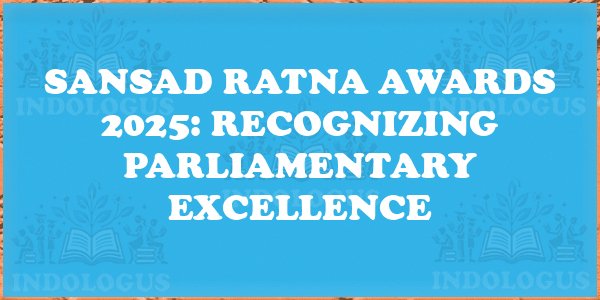The Sansad Ratna Awards 2025 celebrate MPs and committees that have shown exceptional commitment, quality debates, and accountability in parliamentary democracy. On 26th July 2025, seventeen Members of Parliament (MPs) were honored for their outstanding contributions in the 18th Lok Sabha.
Background of Sansad Ratna Awards
The Sansad Ratna Awards were established in 2010 to recognize outstanding parliamentarians, inspired by Dr. A.P.J. Abdul Kalam’s vision. These awards set performance benchmarks based on debates, bills, questions, and committee involvement, promoting legislative productivity and accountability.
Significance of Sansad Ratna Awards
- Encouraging Accountability: Recognizes MPs for transparent and constructive parliamentary work.
- Strengthening Democracy: Motivates legislators to actively engage in policymaking and debate.
- Setting Standards: Provides a measurable yardstick for parliamentary effectiveness.
- Acknowledging Consistency: Rewards MPs maintaining high performance levels across terms.
Key Highlights of 2025 Awards
- Total Awardees: 17 MPs from diverse parties and regions.
- Notable Winners: Supriya Sule (NCP-SP), Ravi Kishan (BJP), Nishikant Dubey (BJP), Arvind Sawant (Shiv Sena-UBT).
- Special Jury Awards: Four MPs recognized for consistent performance since the 16th Lok Sabha.
Committee Category
- Standing Committee on Finance: Chaired by Bhartruhari Mahtab.
- Standing Committee on Agriculture: Chaired by Dr. Charanjit Singh Channi, Congress.
Objectives of the Awards
- To inspire MPs to raise the standard of parliamentary debates.
- To foster accountability and transparency in legislative work.
- To encourage youth and citizens to appreciate effective parliamentary practices.
- To institutionalize recognition for consistent and high-quality contributions.
Key Takeaways for Competitive Exams
- Importance of recognizing parliamentary excellence through Sansad Ratna Awards.
- Parameters for evaluating legislative productivity and accountability.
- Encouraging MPs to actively participate in policymaking and debates.
- Significance of setting standards for parliamentary effectiveness.



